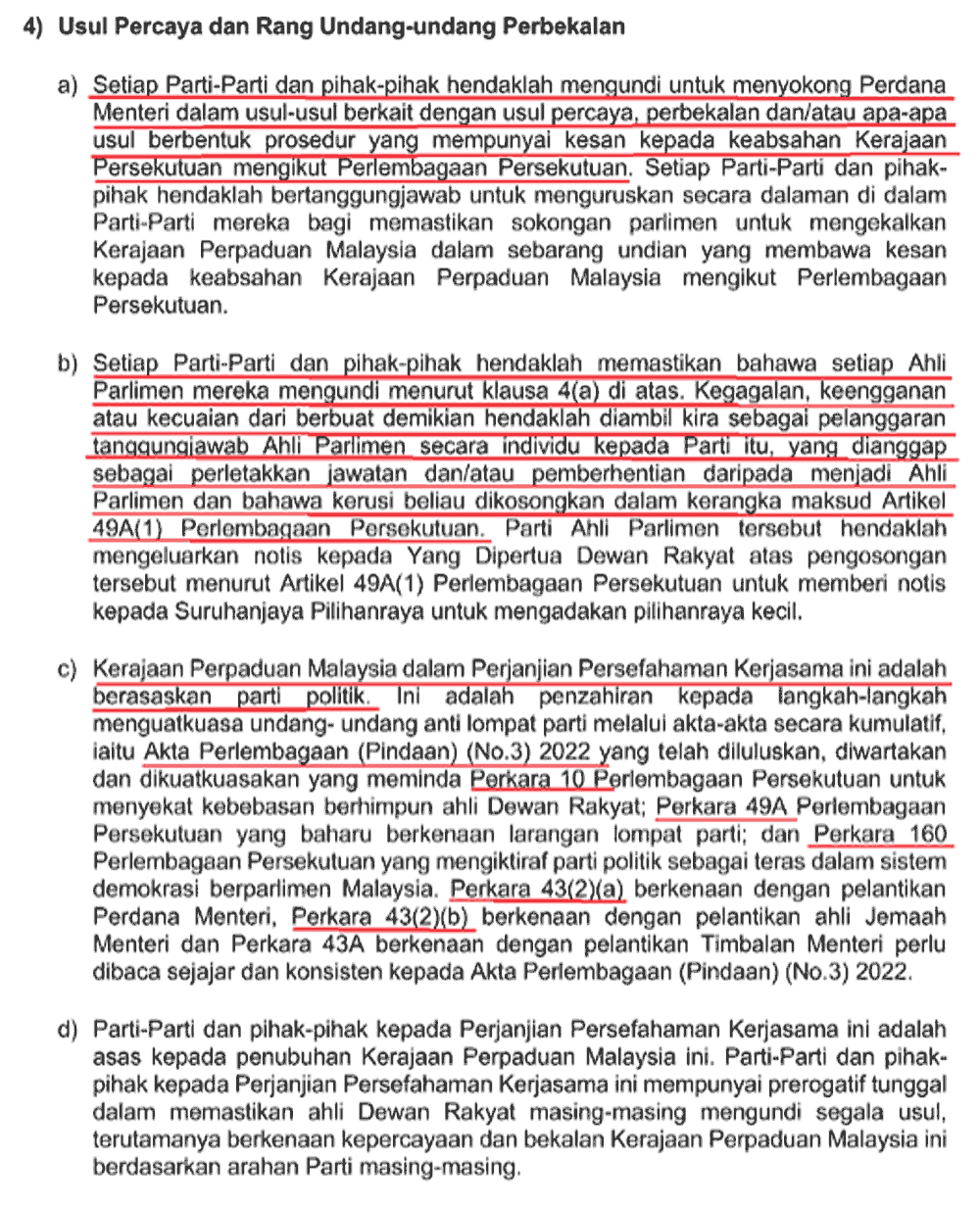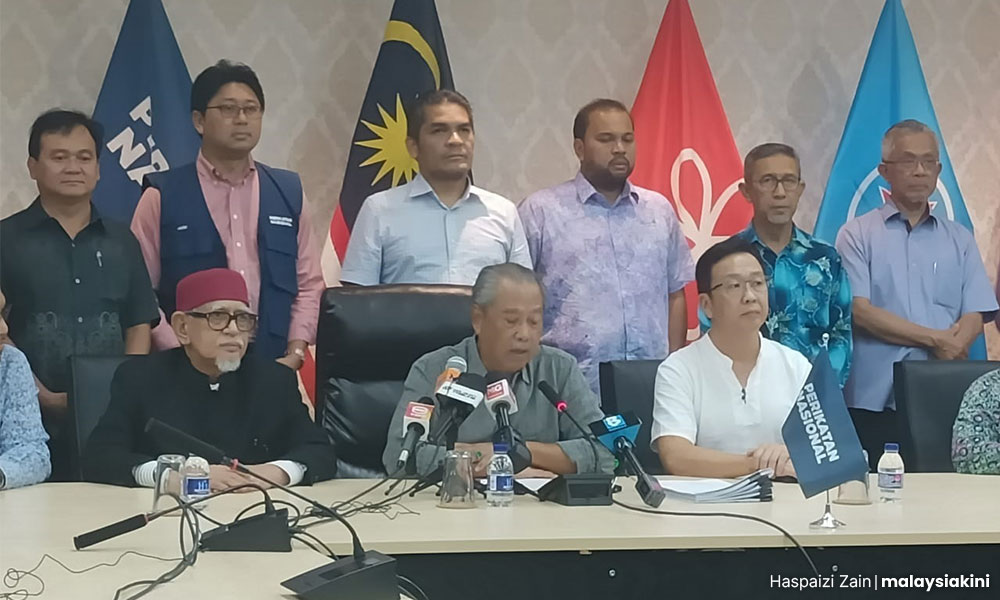Prime Minister Anwar Ibrahim has done two things his two predecessors did not or could not do. First, seeking a confirmatory vote of confidence, and second, having a coalition government agreement with coalition partners.
Both can help Malaysia transition from having a majority government to making the best out of hung parliament, as listed in Bersih’s 10-point recipe for a stable post-election coalition government.
However, Anwar’s coalition government agreement (termed memorandum of agreement, MOA) has been much slammed by the opposition Perikatan Nasional and many members of the public for forcing the coalition members’ MPs to support Anwar in his confidence vote or face a by-election.
Can the MOA disqualify MPs?
The MOA has been called unconstitutional and Anwar’s confidence vote seems to have been delegitimised by it. Is such an interpretation true?
Point 4(a) of the MOA states the intention of the five parties involved - Pakatan Harapan, BN, GPS, GRS and Warisan - to support the prime minister on confidence, supply and any other procedures that may constitutionally affect his legitimacy.
Point 4(b) further states that their intention to ensure each of their 144 parliamentarians combined to vote accordingly and their failure, reluctance or carelessness in doing so would be tantamount to their resignation or ceasing to be party members, hence facing the consequence of seat vacation under the anti-hopping law, Article 49A of the Federal Constitution.
Do these intentions translate into reality by the mere effect of their announcement? Of course not.
To realise Point 4(b), the parties must have the means, which can exist in only two forms.
First, provisions of the party constitution for defiance of party instruction in such voting (or generally in any legislative voting) are to be deemed as an act of resignation or an act that causes one to cease being a party member. This is to date found only in DAP and Amanah, which would bind their respective 40 and eight MPs.
Second, in absence of a such provision in the party constitution, any alternative legally binding instruments can cause such an effect.
BN has claimed that the documents its 30 MPs signed with its chairperson had such an effect. This claim may be challenged in the court but it appears accepted by the 10 BN parliamentarians who withdrew their earlier-signed statutory declaration (SD) in support of Muhyiddin Yassin’s prime-ministerial bid.
In short, Point 4(b) of the MOA is enforceable to 78 MPs from DAP, Amanah and BN. I cannot see how this is unconstitutional until such party constitution provisions or alternative instruments are ruled so by the court.

What would happen to the 66 MPs from PKR, GPS, GRS, Warisan and UPKO if they vote against Anwar or simply be absent tomorrow? Absolutely nothing.
Until their parties inform the speaker that their MPs have resigned or ceased to be party members by violating party instruction on the confidence vote, and the speaker writes to inform the Election Commission of their vacancy, nothing unconstitutional arises.
In conclusion, Point 4(b) of the MOA would remain a statement of intention, with no material effect on the outcome of the confidence vote on December 19.
With the MOA, the 66 unbound MPs can vote against Anwar and keep their seats. If their parties sack them, they would be free from Article 49A for the rest of the term.
And even without the MOA, the 78 MPs from DAP, Amanah and BN are bound until they challenge their party constitution and whatever alternative legal instrument in court.
So, to use the currently toothless MOA - however one may disagree with it - to foreshadow a denouncement of the confidence vote is ingenious.
A confidence vote is a confidence vote
Muhyiddin should work hard to get as many MPs as possible from the 66 unbound MPs from the MOA parties, and four other MPs in support of the coalition government but not a party to the MOA, to vote against Anwar.

He can even try persuading the 78 in DAP, Amanah and BN to vote and challenge the application of Article 49A in court.
Muhyiddin must accept this simple fact, regardless of the MOA, the confidence vote tomorrow is a confidence vote, with only two potential outcomes, Anwar fails, or Anwar proves his majority.
If Anwar fails, he has promised to resign and Muhyiddin can immediately set out to form his government.
If Anwar succeeds, will Muhyiddin just accept the outcome, and let the nation move on? Malaysians have a life to live for five years from Dec 19, 2022, to Dec 18, 2027, when the 15th Parliament stands dissolved.
The fact is that Anwar has 148 votes on paper, how likely can he lose 37 votes en bloc?
To dismiss the expected outcome of the confidence vote is to deliberately deny Malaysia a closure on GE15, much like Donald Trump insists that he had won America’s 2020 Presidential election.
Anwar has shown he can do what Muhyiddin and Ismail Sabri Yaakob fail to do as prime minister in seeking a confidence vote and getting government parties to sign and publicise a coalition government agreement.
Muhyiddin can in turn do what Anwar had failed miserably as opposition parliamentary leader after the Sheraton Move. Indulging in calling PN the “backdoor government” and orchestrating a counter-Sheraton, Anwar had failed to lead the opposition and form a shadow cabinet.
Muhyiddin should really lead PN to be a responsible and professional opposition and win a clear or stronger mandate in 2027.
A scorched earth strategy is doing injustice to not only Malaysia but also the 74 MPs from PN who may do well and be ministers in five years’ time.
Look at the World Cup. Football fans want the 31 defeated teams to come back stronger four years from now, not complaining for four years about how their victory was stolen.
Confidence and supply: Party-based or MP-based decision?
The MOA has its flaws, of course. But it is also a brave attempt to stabilise Malaysian politics to end the “government of MPs” and re-establish the “government of parties”, underlined in Point 4(c) of the MOA.
The political chaos that Malaysia endures is fundamentally rooted in the flawed practice of “government change by SDs”, starting in Perak in 2009.
In this flawed model, a parliamentary government is reduced to an ad-hoc medley of MPs grouped by their common preference of a prime minister candidate, facilitated by undisclosed and shifting personal deals between the PM and the MPs, instead of a coherent governance programme negotiated by their parties and known to the public.
The Anwar-led coalition government had done the right thing by forming itself on party-to-party negotiation, now publishing their agreement (notwithstanding the lack of details programmes) and next proving its majority in the House.
If such practices continue in future hung parliaments, the politics of SD auction will be eliminated. The constitutional monarchy will also be strengthened by eliminating the possibility of a minority PM being appointed.
However, here comes the tougher part. After the initial party-based negotiation on government formation, should confidence and supply votes continue to be party-based decisions?
Leaving it party-based is restricting the choice of the MPs. This arguably contradicts the Westminster Parliament model where MPs are elected as individuals - notwithstanding candidacy for the party - and should be allowed to vote on their conscience.
However, without strong parties in the real Westminster sense that is based on programmatic difference, leaving confidence and supply votes to individual MPs may simply revive the SD auctioning business, with Parliament as its new trading site.
This is the crux of the debate brought out by the MOA. There is no simple answer and the medium-term solution may require even changing the electoral system to allow for a party-based mandate.
In any case, the complexity of this debate should not delegitimise the import of the confirmatory vote of confidence.
For now, between the two evils, I would opt for restricting MPs’ autonomy than allowing MPs to trade their mandate, simply to avoid a new Sheraton cycle. - Mkini
WONG CHIN HUAT is an Essex-trained political scientist at Sunway University. He is a professor at the university’s Sustainable Development Solutions Network (SDSN) Asia. Mindful of humans’ self-interest motivation while pursuing a better world, he is a principled opportunist.
The views expressed here are those of the author/contributor and do not necessarily represent the views of MMKtT.




No comments:
Post a Comment
Note: Only a member of this blog may post a comment.